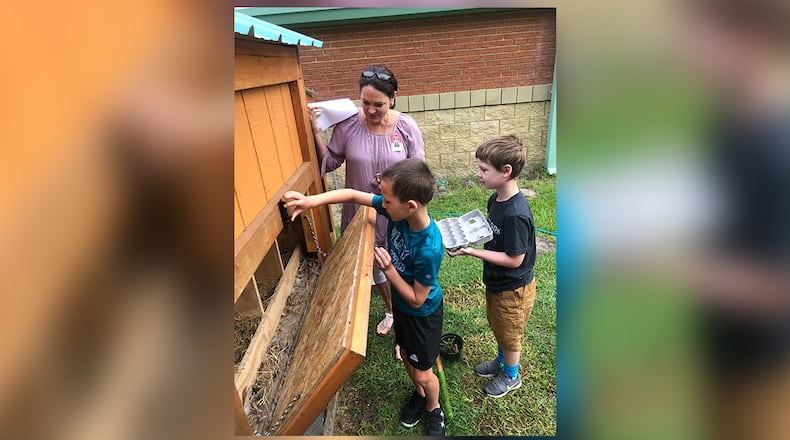A state education initiative seeks to entice more students to agriculture jobs by offering them courses — some beginning in kindergarten — to better acquaint them with one of the state’s oldest industries.
The state’s agriculture industry adds about $75 billion to the economy each year and provides jobs for more than 400,000 people. But schools have not been preparing enough people to fill the jobs.
When the new school year begins, 20 Georgia elementary schools will roll out agricultural education courses — the first elementary schools in the state to do so — with many hoping to entice future workers into that broad field by getting them interested much earlier.
Agricultural education is offered in metro Atlanta middle and high schools, but this is the first time it is being offered by the state to students in grades kindergarten through five.
“In its purest sense, agricultural education is the foundation to a stronger economy,” said Christa Steinkamp, the curriculum and technology director for the Georgia Department of Education’s Agriculture Education division. “Even if you’re not a farmer, the agriculture umbrella covers so many other opportunities. We want to make sure kids understand that.”
The state Legislature approved the agricultural education curriculum for elementary schools during the 2018 legislative session. Teachers across the state are working with the Georgia Department of Education to finalize lesson plans for the 2019-2020 school year. Billy Hughes, program manager for Georgia Agriculture Education, said the lessons will largely be tied into everyday instruction, as teachers seek to increase agriculture literacy through real situations. Students likely will engage with farm animals and build their own gardens, among other things.
“Kids are more excited about coming to school when they can actively participate in the lessons,” he said. “Once they know they can relate (the lesson) to something in their life that has to do with agriculture, it will get them more excited. Everything can be tied back … in order to make the learning relevant in the classroom. Our jobs is to prepare our students for jobs. It’s just better off for the students and the teachers.”
State Sen. John Wilkinson, who chairs the Senate Agriculture Committee and is co-chair of the education committee, said the lessons will prepare students for careers in agriculture and give young people a greater respect for the food they eat.
“There was a time where the majority or people were involved in farms,” said Wilkinson, R-Toccoa. “As we get farther and farther away from the farm, a lot of our young people think food comes from a grocery store. We thought it would be good for all our students to at least have an idea of where their food comes from and what it takes to produce it. A lot of times, we take our food for granted. It’s really easy to do.”
According to state data, one in seven jobs in Georgia is directly related to agriculture. According to the Governor’s High Demand Career Initiative Report, jobs in the agriculture area include brewery workers, machinists and engineers of all kinds — chemical, mechanical, computer, bakery and electrical among the most in-demand. According to the University of Georgia’s Center for Agribusiness and Economic Development, just 55 percent of those needed in agricultural fields are graduating from University System of Georgia institutions. Companies have reported that candidates for jobs including welders, mechanics and maintenance technicians are being recruited from outside the state to meet demand.
Wilkinson said the earlier lessons should give students a better chance at getting those jobs once they become adults.
“The younger we can get students involved that would be a plus for all of us,” he said
Of the 20 schools selected for the pilot agricultural education program, one is in metro Atlanta: Cogburn Woods Elementary School in Fulton County. Yalanda Bell, the district’s executive director of career technical agricultural education, said the school’s program will feed students into middle- and high-school programs to continue their educational pathway toward the agriculture field.
“We have a big STEM (Science, Technology, Engineering and Mathematics) focus in this district, and STEM is about the outcomes, and it’s a way to give students applicable skills and hands-on skills for STEM,” she said. “It’s a way of teaching the integration of STEM in the lane of (agricultural) science. We felt it was a natural fit.”
Agricultural science is one of 17 programs in Fulton County’s CTAE division. The program features skills that translate to forestry, plant science, horticulture, renewable energy and agribusiness, among others.
“Our mission is to prepare them to succeed on their own path,” Bell said. “We’re really excited about this program, and the potential it has.”
About the Author
Keep Reading
The Latest
Featured


